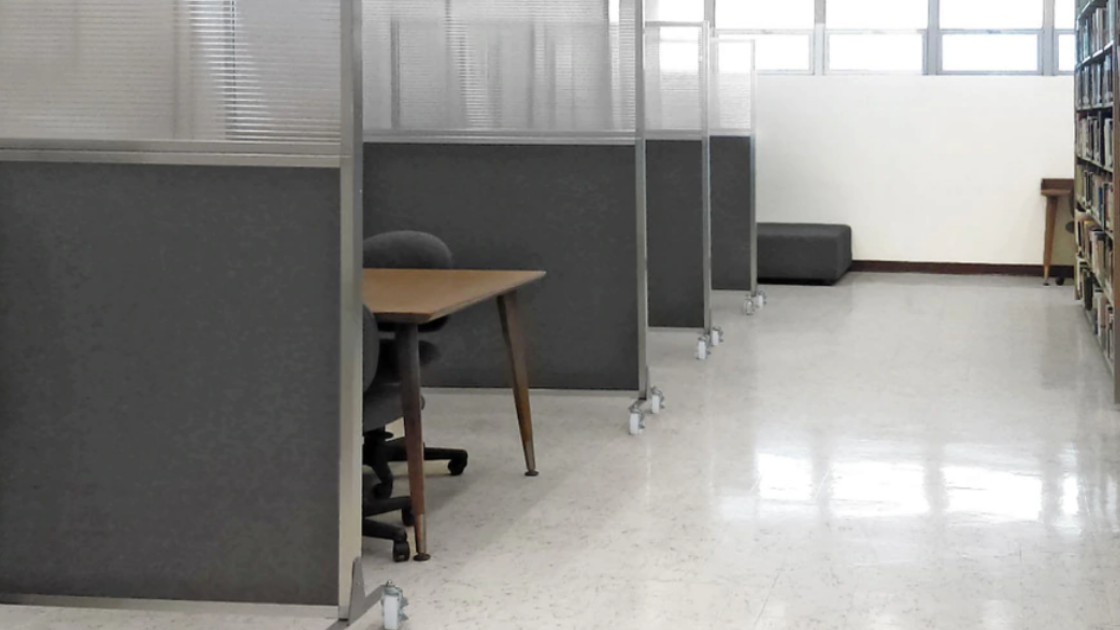
The activity and noise of a busy office can be distracting. Office equipment, ringing phones, conversations among co-workers, the buzz of HVAC systems and more combine to create an overwhelming amount of noise that has a negative affect on our productivity, concentration, and health, not to mention employee morale and job satisfaction. In fact, excessive noise is one of the most common complaints of employees in corporate office settings, especially in open office layouts where a lack of walls only increases the din of office noise. If noise is a problem in your office, Versare’s Hush Panels can help you create an optimal work environment that absorbs sound and decreases distractions.
The Effects of Office Noise
Excessive office noise can negatively affect us in a variety of ways, including:
- Decreased Productivity: According to a 2014 study by Steelcase, the average worker loses 86 minutes a day due to noise distractions! Chatty co-workers, noisy office equipment, ringing phones and other sounds can add up to a lot of distractions throughout the day. Poor office acoustics exacerbate this problem, lowering productivity even more. For more on the ways sound affects work productivity, see our recent blog post on the topic.
- Health Problems:Noise can contribute to a bevy of health issues such as hearing loss, hypertension, sleep disorders, cardiovascular disease, impaired cognition, and exhaustion. We instinctively monitor sounds in our environment as possible dangers - a trait that remains in our neurobiology as a remnant of evolution. Because of this, excessive noise makes us uneasy and can cause elevated blood pressure and the release of stress hormones, putting strain on our cardiovascular systems.
- Impaired Concentration: Since we are so inclined to listen to what’s going on around us, excessive noise can be distracting and make it difficult to focus on the task at hand. And the fluctuating nature of office noise is worse for our concentration than consistent levels of background noise. The noise of the office also includes conversations, which are more distracting to us than other sounds. According to Julian Treasure, the chairman of The Sound Agency, each of us only has the bandwidth for about 1.6 conversations. If you overhear someone else’s conversation, that takes up one of that 1.6, leaving you just .6 of a conversation left to listen to your own inner voice. In other words, if someone is having a conversation near you, you won’t be able to fully concentrate on your own thoughts.
Add Sound-Absorbing Materials
The effects of office noise can be reduced by absorbing some of that sound. Hard surfaces like desks and walls tend to reflect sound, making noise levels worse; bringing in softer materials like carpets, upholstered furniture, and acoustic panels will help absorb sound. The Hush Panel’s 2”-thick fabric panels offer maximum privacy and sound dampening, making it an ideal privacy screen for shared office cubicles, work stations, waiting areas, or even a portable art wall. And with 22 color options, a sleek and modern design, and a semi-transparent polycarbonate window to bring in natural light, these panels won’t take away from your office aesthetics.
Change Your Office Layout
Another way to reduce noise is to change your office layout. This is especially helpful if you have a lot of open, shared office space. Consider the purpose of each room or area of the office and rearrange it accordingly: What kind of work happens in each space, and what will workers need in order to be their most productive? An area where group work or meetings take place will have different sound needs than a workspace where more complex, focused individual work needs to happen.
For example, create group work areas by arranging desks in clusters surrounded by Hush Panels to compartmentalize noise. Or put all office equipment (printers, faxes, etc) in a separate room or area separated by Hush Panels for significant noise reduction. The Hush Panel can also be seamlessly integrated with our popular Hush Panel Configurable Cubicle Partition for an infinite possibility of arrangements.
Provide Dedicated Quiet Spaces...
Having dedicated quiet spaces in the office can give employees a place to retreat to when they need to work on a task or project that needs greater focus. Designate an empty office or unused conference room as a quiet room, or create such a room in an open area using Hush Panels.
...And Dedicated Loud Spaces
In the same vein, dedicate specific areas in the office for group work or discussion. A lunch room or conference room will work for this, or create a designated area using Hush Panels. Also, consider creating “phone booth” areas that employees can use to make calls so they don’t disturb their neighbors with their conversations.
 New Zealand Dollar
New Zealand Dollar

